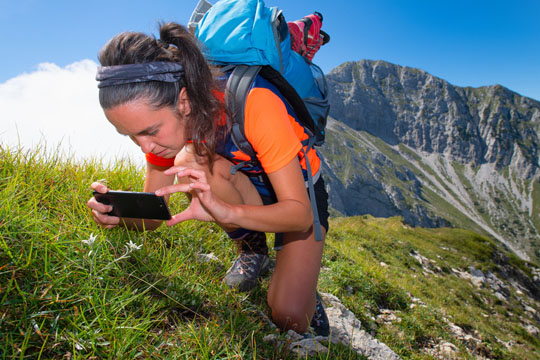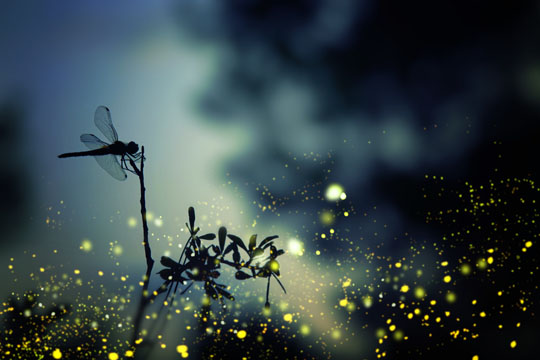Changing values with heart and soul
Freiburg, Oct 05, 2018
The ‘Wissensdialog Nordschwarzwald’ is a joint research project on the Black Forest National Park that also involves the University of Freiburg. The project deals with issues such as sustainable regional development and science communication. Backed by the Baden-Württemberg Ministry of Science, Research and the Arts (MWK), the project is what is known as a living lab: research is carried out in a social environment with the aim of providing immediate benefits for the community. While on a course, Freiburg students developed ideas – ranging from a photo-community app that can be used to identify plants, a walking tour to introduce and marvel at insects that are active at night, through to concepts such as car-sharing, designed to increase critical awareness of consumption.
 Who grows there? Those who are curious about nature can network and exchange information with a photo-community app.
Who grows there? Those who are curious about nature can network and exchange information with a photo-community app.
Photo: michelangeloop/Fotolia
In summer 2018 the Wissensdialog Nordschwarzwald reached a mile-stone: after three years of activity, the project received further funding for another two years. Freiburg forestry scientist Dr. Regina Rhodius is the CEO of the association and also teaches degree courses. On the ‘Sustainable development in the Black Forest national park region’ course, students were able to give free rein to their creativity – and not just purely theoretically. “Practical application is a great advantage,” says Rhodius. “For instance, excursions to the national park will always form part of the module. In addition, students were in constant communication with regular stakeholders.” These were people such as administrators of the national park or tourism industry representatives, who mentored the students and gave them feedback on their work.
Did the project also benefit from the students’ work? “Yes, because they contribute new impetus,” emphasizes Rhodius. “And it is quite a change when young people who have created something with their heart and soul are in communication with tourism industry representatives, forestry people, entrepreneurs or interested citizens. It makes the others open up, and helps people to discuss difficult issues very openly.”
 Experiencing the dark with every sense: on a night-time walking tour children can learn about insects that are active at night. Photo: tomertu/Fotolia
Experiencing the dark with every sense: on a night-time walking tour children can learn about insects that are active at night. Photo: tomertu/Fotolia
Escaping the ivory tower
The results have surprised and inspired them, Rhodius admits. The ‘Go Nature’ project is a good example. The four students who developed the idea wanted to counteract the growing alienation of people from nature – using an interactive photo-community app that helps those who are curious about nature to network and exchange information. “Firstly it’s about increasing knowledge of the environment. For instance, the community can help to identify plants,” says Maximilian Peter. “But the app should also have an entertaining aspect. The aesthetics of nature are important to us.”
Is there really a need for an app like this? “We did a survey,” says Tapio Werth. “Our questions were answered by 130 people. There was a lot of agreement, but also critical voices – such as the accusation of gamification.” Some were extremely disturbed by the entertaining elements of the app. Regardless of the question of whether the app is realized, Peter already believes he has benefited. “Of course the project also was and is about the process itself. You escape the ivory tower and learn from practical examples, such as how you network, and how people can help and support one another.”
Insects at night
Ilja Morgenstern and Irina Vesa’s project is a children’s night-time walking tour of the Engelsberg in the nature park. The goal of the walking tour is to observe insects that are active at night. “The children ought to experience and learn things that cannot be taught in school,” says Vesa. “They need to experience and connect with nature at night with all their senses.” Morgenstern remarks, “It shouldn’t just be a sequence of tasks that the[1]y do. Even the fact that the walking tour takes place at night may be something entirely new for them – and with luck something that they like to remember later and can say: Yes, I learned something there.”
Malin Herke and Mirjam Jakob focused their group on the question of how values of the administration of the national park can contribute to community politics and the economy. In drawing up a practical guide, they shifted the emphasis from the term ‘sustainability’ to ‘sufficiency’. That means: reducing consumption or even avoiding it entirely – and so creating an added value. “Our project is designed to stimulate a change in values for each and every one of us. But we wanted to go further and also discuss issues such as excessive land usage,” says Herke.
 Room for one more! Car-sharing can encourage greater critical thinking about everyday consumption. Photo: zinkevych/Fotolia
Room for one more! Car-sharing can encourage greater critical thinking about everyday consumption. Photo: zinkevych/Fotolia
Abstention brings benefits
Why is abstention worthwhile? “It benefits nature, but also people,” says Jakob. “If you aren’t constantly consuming, you have more time. And of course you learn to treasure what you already have. Concepts such as car-sharing or repair cafés bring social added value to a sense of community.” Herke adds, “It also leads people to reflect, to consider: Hey, how well are we really doing? Do I really need another new smartphone?” The two students report that the project was well received at the presentation in Bühlertal.
For Regina Rhodius the appeal of the course is primarily that the students are not creating their concepts to simply be filed and forgotten: next year Morgenstern and Vesa will be setting off with torches to track down the night-time inhabitants of the Engelsberg with a group of children.
Hans-Dieter Fronz
Northern Black Forest Knowledge Exchange

